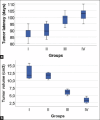Effect of Ambrosia arborescens Mill. ethanolic extract on breast cancer induced in rats
- PMID: 38680140
- PMCID: PMC11045533
- DOI: 10.14202/vetworld.2024.700-704
Effect of Ambrosia arborescens Mill. ethanolic extract on breast cancer induced in rats
Abstract
Background and aims: Ambrosia arborescens Mill. (A. arborescens) is an aromatic plant used in traditional medicine as an anti-inflammatory, anti-tussive, anti-rheumatic, and anti-diarrheal agent. This study aimed to evaluate the effect of A. arborescens Mill. on a Rattus norvegicus var. albinus-induced breast cancer model.
Materials and methods: We collected A. arborescens from the province of Julcán, La Libertad Region, Per, and prepared an ethanolic extract using pulverized leaves macerated in 96° ethanol for 72 h with magnetic stirring. In the evaluation of anticancer activity, four experimental groups with 10 female rats each were formed: Group I (Control-7,12-dimethylbenz[a]anthracene [DMBA]), which received DMBA (single dose) and physiological saline solution for 4 months, and Groups II, III, and IV, which received DMBA (single dose) and 200, 400, and 600 mg/kg/day of the ethanolic extract of A. arborescens, respectively, for 4 months.
Results: The DMBA control group presented histological characteristics of ductal carcinoma in situ with necrotic and inflammatory areas, whereas the A. arborescens extract group showed a decrease in tumor volume and recovery of the ductal duct.
Conclusion: Ethanol extract of A. arborescens leaves decreases tumor development in rats with induced breast cancer, and this effect is dose-dependent.
Keywords: 7,12-dimethylbenz[a]anthracene; Ambrosia arborescens; breast carcinoma in situ; cancer; rat.
Copyright: © Silva-Correa, et al.
Conflict of interest statement
The authors declare that they have no competing interests.
Figures


References
-
- World Health Organization. Cancer. 2023. [Retrieved on 03-12-2023]. Available from: https://www.who.int/es/news-room/fact-sheets/detail/cancer .
-
- World Health Organization. The Global Cancer Observatory. 2023. [Retrieved on 03-12-2023]. Available from https://gco.iarc.fr .
-
- Hanahan D, Weinberg R. The hallmarks of cancer:The next generation. Cell. 2011;144(5):646–674. - PubMed
-
- Mostacero-León J, Peláez-Peláez F, Alarcón-Rojas N, De la Cruz-Castillo J, Alva-Calderón R, Charcape-Ravelo M. Plants used for the treatment of cancer expanded in the main markets of the province of Trujillo, Peru, 2016–2017. Bol. Latinoam. Caribe Plantas Med. Aromat. 2019;18(1):81–94.
LinkOut - more resources
Full Text Sources
